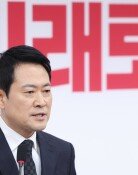<8> Spurring Demands for Abolishment of Information Agency
<8> Spurring Demands for Abolishment of Information Agency
Posted December. 17, 2007 18:14,
Information Agency Degraded to Vehicle Not for Public Relations But rather Presidential Relations
Recently presiding over the first party meeting at the National Assembly, Grand National Party (GNP) floor leader Ahn Sang-soo repeated his promise to introduce a bill during the parliamentary September session to abolish the Government Information Agency. Most scholars side with his position. According to them, the agency has become a personal advertising tool of South Korean president and his administration. More and more people are calling for its disbandment, ever since the agency announced Advanced Media Support System to ban reporters contacts with government officials, and to shut down existing pressrooms in government buildings. Under the Advanced Media Support System, which was originally directed by President Roh, reporters are only allowed access to the briefing room of each agency. The agency has spearheaded the distorted press view and practice of Roh, and earned heavy criticism for its trouble. Now, it faces its abolishment.
Push for Gagging the Press-
Back in January 2007, Roh opened his typical bad-mouth against the press at a cabinet meeting, Hunkering down in the pressroom, reporters are distorting the message to the public. Four months thereafter, Roh came up with an anti-free speech tool under the guise of the Advanced Media Support System. It is the second biggest effort by Roh to hinder the press access to information sources. Previously, in 2003, he implemented the so-called open briefing system.
The Government Information Agency has played a key role in conception and execution of all these anti-free speech tactics. It has conducted case studies on other countries, and tailored the data to Rohs taste. Taking all the heat from scholars and the press for Roh, it is pushing the initiatives forward. Despite strong opposing voices, Roh officially praised the agency and expressed his unwavering support for it.
The new measures did not come as a surprise. Roh, through the Information Agency, took calculated steps to smother critical voices, inch by inch.
Immediately following Rohs inauguration in March 2003, it began to enforce the open briefing system, signaling the tough road ahead for the press. It revoked all the press passes of reporters thereby dissolving their access to government agencies.
Then, the Government Information Agency imposed a mandate on government bodies to pass its preliminary review if a body or state-owned corporation wished to run a newspaper advertisement. People outside of the administration decried it as an attempt at comprehensive press control.
Furthermore, it promised to monitor how each agency would react to newspaper criticism of the Roh administration. It has reflected its monitoring results as one of the most important factors in the assessment of each agencys on-the-job performance. Usually, the Information Agency gives high points to an agency that files a claim with the Press Arbitration Commission or commences a lawsuit; and that induces apology or correction from a news company.
Experts also point to the double standards employed by the Government Information Agency.
The Government Information Agency has tried to tame critical voices through its new initiatives, while encouraging and awarding newspapers and broadcasting companies friendly to Roh by means of various sponsorships.
It opened a portal site, KOREA.net, in September 2003, and established two subsidiaries KTV and bi-weekly magazine, Kplus. The Government Information Agency has since funneled millions of dollars into each. This year, for example, it earmarked an aggregate total of $22 million for the three publicity outlets.
In addition, the Roh administration recently approved a KTV staff increase request. And since then, the TV station has been hotly promoting Rohs new press control measures. Roh lauded its intense coverage as substantial, but an average of only 0.06% of viewers nationwide bothered to tune in.
Grand National Party (GNP) spokeswoman Nah Gyeong-won snapped, saying, The briefing system purported to promote public understanding of national policies. In substance, it is a vehicle used for maligning critical newspapers and TV stations.
Personal Special Forces for Roh-
In November 2005, all of the 127 GNP representatives introduced new legislation to abolish the Government Information Agency and streamline the whole administration. The GNP has pledged to pass the bill in the September regular session, which is currently pending with a subcommittee.
The bill details why and how the agency constitutes a public evil. The bill states, for example, that the information agency violates the constitutional right of free speech and the constitutional obligation of political neutrality imposed on government officials. The promotional government body forces government employees to respond to critical newspapers and TV stations based on its artificial and biased criteria.
The bill also points out why its existence is a waste of tax-payers money. The Government Information Agency allegedly performs the tasks that are typically handled by the public relations division of each agency.
GNP Rep. Jeong Jong-bok, who is leading the legislative move, fumed, The agency has fallen into a private arm of Roh. To this day, it spends millions of tax dollars. Jeong cites several examples in the bill. The Government Information Agency, for example, spent $60,000 on publication of a promotional book for Roh. In another case, KTV spent tax money to host debate sessions where only pro-Roh guests and panelists appeared. The Korean Broadcasting Commission later reprimanded the state-owned station for its biased broadcasting. KTV also aired a lecture by pro-Roh speaker Lee Byeong-wan an individual who was on the government payroll at that time.
Politicians are not the only criticizing voice against the agency. Numerous scholars point to the social harms stemming from its wasteful and redundant existence.
Dankook University communication and journalism professor Sohn Tae-gyu condemned the agency, saying, Only countries ruled by dictators have an organization like the Government Information Agency. No democratic country attempts to control the press through a centralized promotional system. But the Roh administration is obsessed with such absurdity. It is a cause for national shame. He continued, Every agency has its own public relations unit. Why in the world do we need another such body performing the same task, sitting over the others?
Hansung University public administrative professor Lee Chang-won pointed out, The Government Information Agency is capable of nothing. It does not know how to manage sound relations with the press. Also, what it does is what the promotional division of each agency typically does. In substance, it is a vehicle used for regulating the press and their access to public information. We dont see any practical reason for its existence.
[Catering to the Presidents Personal Needs, Administration after Administration]
Whenever a new administration took office, the Government Information Agency trembled in fear that it would be disbanded. Actually, it vanished several times, and was later reborn under various aliases.
It was and is nothing more than a tool for justifying presidential actions, contrary to its pronounced purpose of policy promotion.
Military regimes have mobilized such agencies to gag the press and thereby blindfold the public to the dictatorship. Contrary to the ordinary belief, the situation worsened under elected administrations. Democracy activists-turned-presidents took advantage of it as well to control the press and to hype their achievements.
First, former South Korean President Rhee Seung-man created the prototype of the agency in November 1948. The first body managed and controlled the state-owned news agency only, and was abolished in 1956. It then sprung back to life after President Park took the power in a coup. Despite the different names it assumed, it existed until 1999. Whatever the name may have been, it was a handy tool for those in power for the manipulation of public opinion.
In 1959, for example, the Rhee administration had it successfully shut down a daily Kyunghyang, which harshly criticized the administration. More than a dozen newspapers and magazines were forced to follow suit. Former President Park Jung-hee made the best out of the agency. Under Park, the agency fired, upon his order, Dong-A and Chosun reporters in 1975.
Yet again, in 1980, when the Chun Doo-hwan administration launched a series of initiatives to kill the critical voices in society, the agency spearheaded the move. Thus, members of the power inner-circle typically took the helm of the agency.
The agency maintained a total grip on the press by issuing the notorious daily reporting guidelines under Chun.
But the same story repeated under the freedom-fighter-turned-president. In 1997, Kim Dae-jung, as a presidential candidate, acknowledged the evil of the agency, and promised to abolish it. Initially, Kim seemed to have kept his word by disbanding it upon taking office in February 1998.
But Kim resurrected the agency in the current name 15 months after its death. Kim stressed the need to promote government policies in May 1999.
The situation worsened when former civil rights attorney Roh Moo-hyun became President. Mobilizing the Information Agency, Roh has been constantly trying to gag or control critical newspapers at any opportunity.
Professor Lee Chang-won explains, Actually, the agency has no particular business. To justify its existence, it has to cater to the power by coming up with various ideas to tame the press to the taste of its ultimate boss.




![[속보]이스라엘 “이란 공격” 국가비상사태 선포…테헤란 폭발음](https://dimg.donga.com/c/138/175/90/1/wps/NEWS/IMAGE/2026/02/28/133440981.1.gif)


